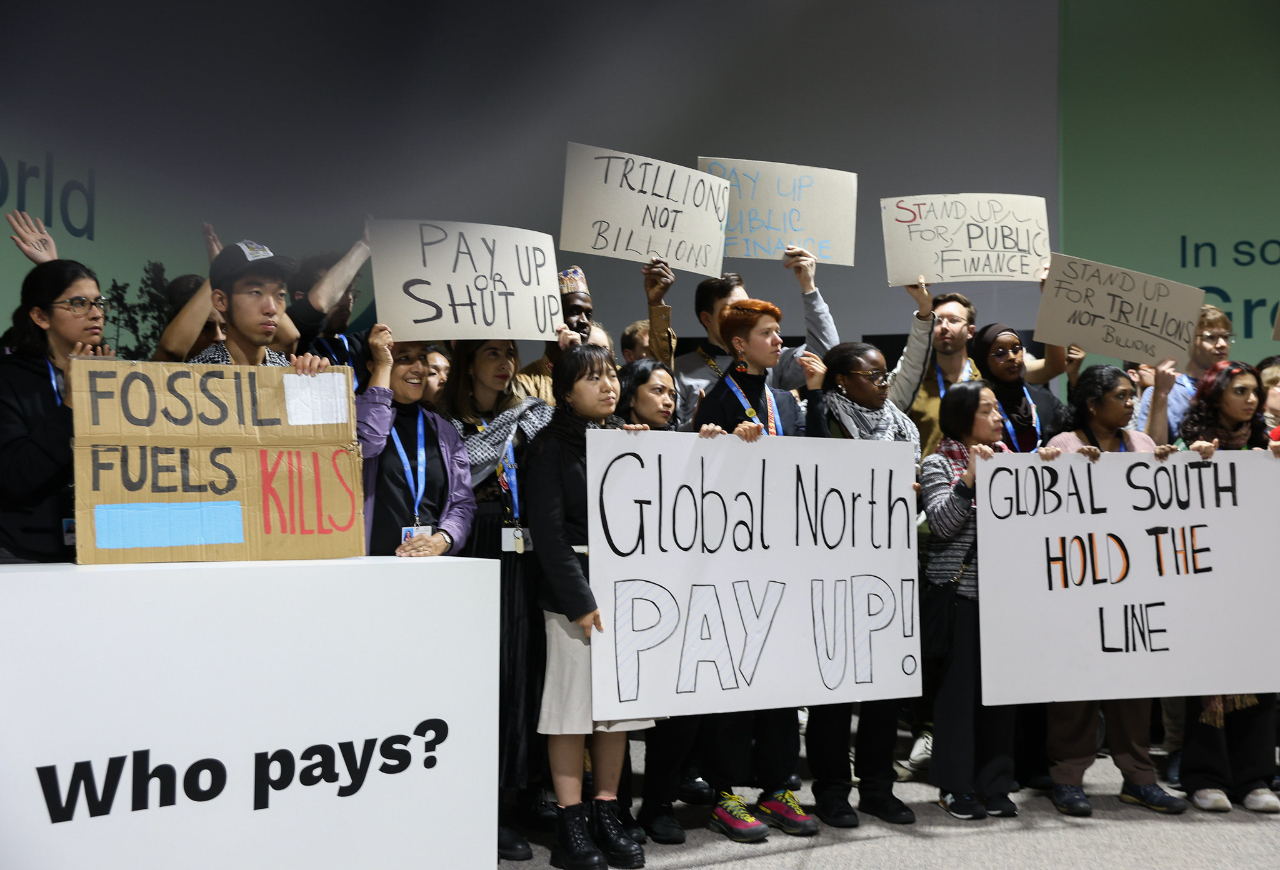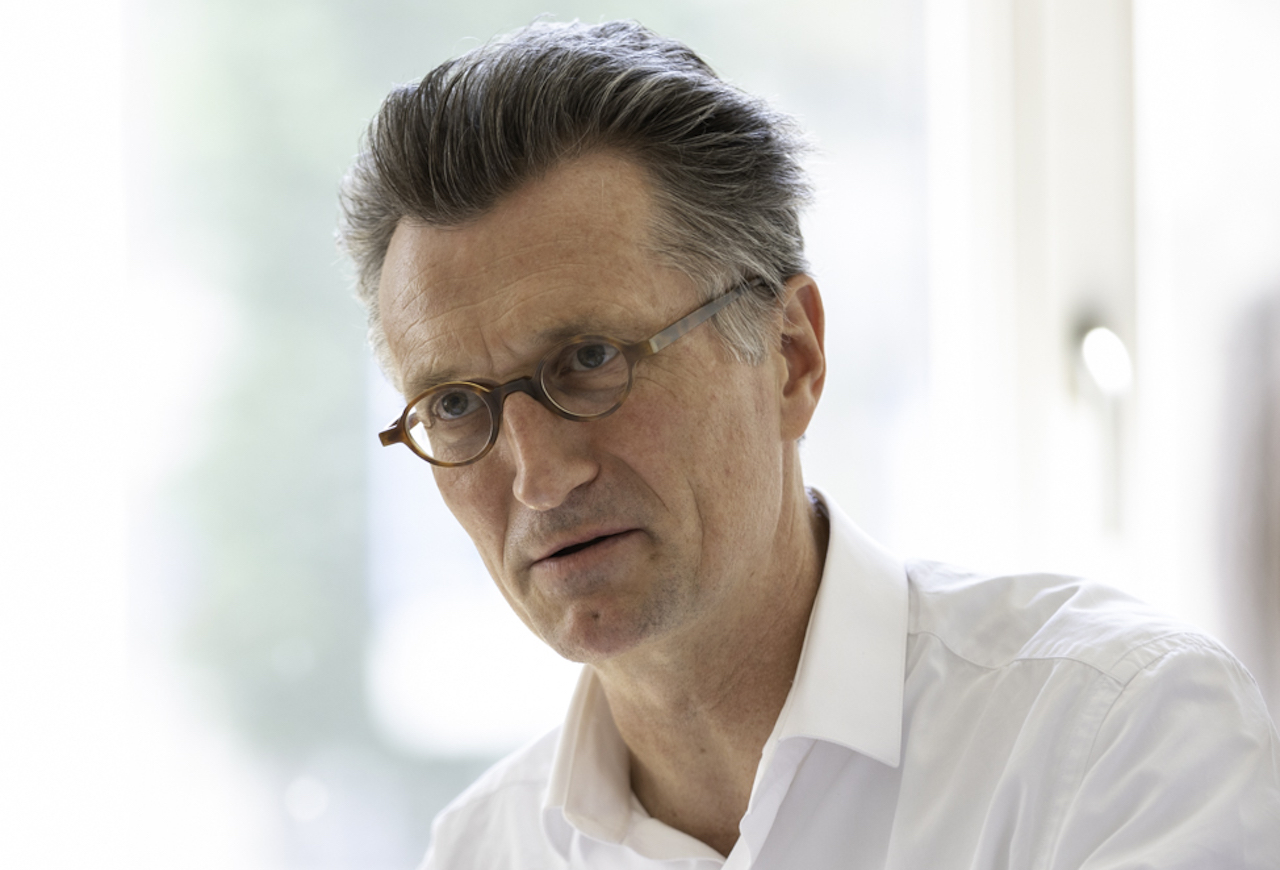The Baku climate change summit produced an agreement by governments to increase spending on climate mitigation and adaptation, but how much of this finance will be used to leverage private sector funding remains to be seen.

Activists condemned governments at COP29 for failing to provide enough funding to combat climate change impacts. Private sector investors will need to play a key role if the financing gap is to be closed | UN Climate Change – Kiara Worth
The UN-backed COP29 climate summit in Baku, Azerbaijan, produced a last gasp climate finance deal covering support from richer nations for poorer ones, which fell well short of what those at the sharp end of climate impacts say is required. The deal also put a heavy emphasis on mobilising private investment to achieve climate goals.
Under the agreement, nearly 200 countries agreed that at least $300bn (€285bn) a year should be provided to the developing world by 2035 to combat climate impacts and speed the energy transition. That figure was a fraction of the $1.3trn a year some countries and environmental groups at the conference said was needed to meet the climate challenge, and was also below the $500bn that G77 countries were seeking from wealthy nations. But it did at least represent an increase from a longstanding $100bn a year target, which was only recently met.
The role of private investment
Much of the shortfall is supposed to be met by improving conditions for climate-related private investment, through blended finance initiatives, guarantees and other mechanisms. The details are due to be addressed more fully in the run up to the 2025 COP30 meeting in Belém, Brazil, under a ‘Baku to Belém Roadmap to 1.3T’ plan.
This has been interpreted by some as buck-passing by governments in developed nations, while others see it as a big opportunity for those seeking to make impactful investments.
Laure Wessemius-Chibrac, managing director of the Netherlands Advisory Board (NAB) on impact investing described the conference as “a travesty”, with rich countries agreeing lower-than-required funding, while oil deals were being made behind the scenes in hydrocarbons-rich Azerbaijan. She told Impact Investor that governments were failing to take the right measures to improve the current plight of many more people or ensure the future of their own citizens.
“My hope comes from the private sector, and, in particular, from the few good women and men working tirelessly to support and promote impact investing as a decent, sustainable solution: investing to create positive change alongside a financial return,” she said.

Steven Serneels, chair of Impact Finance Belgium (IFB) and a former head of industry group EVPA (now Impact Europe), said it was essential to allocate the agreed funding to leverage impact investment and other private sector funding to the maximum.
“The talk in the impact investing community is about how the $300bn will be allocated, which is not clear. How much will be grants? How much will be blended finance and guarantees to unlock much more capital? If all of it was ‘first loss’ capital, which of course it won’t be, then you could bring in five times the amount through private capital. But if it is just commercial loans, it probably isn’t going to do the trick.”
Fresh approaches needed
Wessemius-Chibrac highlighted the need for improved financial and impact data availability, as well as more de-risking instruments, to mobilise more impact investment in emerging markets, as well as “seriously enabling” policies for the financial sector.

“We might also need to reconsider our ways of practicing finance. How much should the country risk rating weigh in the pricing of a well-performing and well-managed investee? Many experienced emerging markets investors will confirm that the perception of risk triggered by rating agencies far from reflects the performance of their investments,” she said.
Impact investors are also likely to be working in tandem with leading multilateral development banks (MDBs), which said in Baku that they estimated their annual collective climate financing for low- and middle-income countries would reach $120bn by 2030, including $42bn for climate adaptation. The MDBs said they expected to mobilise a further $65bn of private sector investment.
The MDB group included, among others, the World Bank Group, the African Development Bank, the Asian Development Bank, the Asian Infrastructure Investment Bank, the European Investment Bank and the Inter-American Development Bank.
COP29 attendees reported strong representation from the private sector at the event.
Sustainable Energy for All, a UN-hosted organisation supporting the energy transition in developing countries. said that COP29 could be viewed as “a reversal of ambition” compared to the 2023 COP28 meeting in the UAE. However, it said in its commentary on the outcome, that “there may be a silver lining” in the form of the thousands of private sector participants present at the meeting discussing how they could fill the growing financial gap.
Fossil fuels push back
Less encouraging was pressure successfully exerted by oil producers such as Saudi Arabia and Russia to downplay references to a global commitment to the transition away from fossil fuels in the final summit text, which made only an indirect mention of the goal.
Triodos Investment Management, in its commentary on the meeting, said COP29 had fallen short on firming up a roadmap for the global fossil fuel phase-out, noting that financial flows towards fossil fuels still vastly outstripped those being dedicated to climate solutions.
“Globally, governments are spending approximately $7trn each year on fossil fuel subsidies. And the financial sector is funnelling €650bn each year into fossil fuels, perpetuating dependency,” the Dutch-headquartered impact investment manager said.
Such a lukewarm outcome on fossil fuels was seen as a strong possibility in the run up to a summit hosted by oil and gas producer Azerbaijan. COP30 host Brazil is also a significant oil producer, but the country’s climate envoy Anna Toni told France 24 that Brazil would not “shy away” from championing a phaseout of fossil fuels.
Ambitious NDCs
A more accurate guide to climate change progress globally may be the ambition of national climate change goals outlined in a new wave of Nationally Determined Contributions (NDCs), which countries are required to update by February 2025.
Brazil, the UK and the UAE are among those to have already done so. The UK’s new targets, set by the Labour government elected in July 2024, are seen as particularly ambitious, including a commitment to reduce greenhouse gas emissions by at least 81% by 2035, compared to 1990 levels.
In a joint announcement in Baku, the EU, along with countries including Canada, Chile, Mexico, Norway and Switzerland, said they aimed to submit NDCs that would be “aligned with steep and credible emissions reductions”. Signatories called on other countries to set and/or accelerate their net zero greenhouse gas emissions goals.
Among forward step to come out of the meeting was a decision to make fully operational a Loss and Damage Fund – first agreed on at COP27 – intended to support nations most heavily impacted by climate-related disasters. The fund, which the COP29 organisers say has more than $730m in pledged support so far, is due to start distributing funds from 2025.
Carbon market breakthrough
Another step forward was an agreement to push ahead with implementing an international carbon market under a standardised global system that would allow countries, and potentially companies, to trade carbon credits earned from the greenhouse gas emissions reductions to help others meet their climate targets.
The agreement at COP29 to finally get the Paris Agreement Crediting Mechanism (PACM) for country-to-country carbon trading off the ground is seen by some as a major achievement. However, observers said its success will depend on the effectiveness of rules governing the integrity of traded credits, which will be hammered out over coming months.
Triodos said it remained to be seen whether the PACM would enable money to be effectively and transparently moved to the right carbon removal and sequestration projects.
The COP30 organisers are also likely to face the absence of a major political force – and carbon emitter – at the top table, if the US leaves the Paris climate accord as expected after Donald Trump takes office as US president in January 2025. The organisers have suggested that, without the US, the onus will be on European nations to set a strong example for the rest of the world by bringing their net-zero targets forward.
For IBF’s Serneels, a changing political backdrop is unlikely to derail progress towards investment in climate impact.
“The politics can perhaps add or subtract some incentives here or there, but it is the market and the technology that will continue to drive the energy transition, because impact investing in the green transition makes sense economically.”
Jacqueline Novogratz, CEO of impact investor Acumen, who was at COP29, said capital needed to move swiftly and boldly, unencumbered by bureaucracy, to where it’s needed most to effectively tackle the climate crisis.
“Too often our commitments are mired in process rather than focused on outcomes, eroding trust in the international financial community. Impact investors can model the collaboration across institutions, bold risk-taking, and speed required to ensure a just energy transition for those who’ve done least to create this crisis,” she said.






